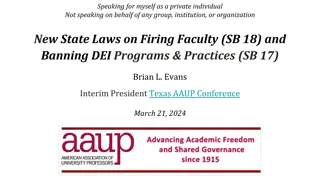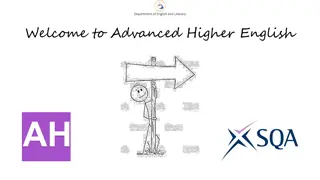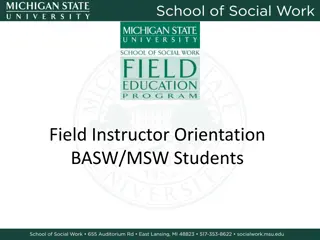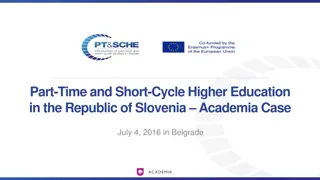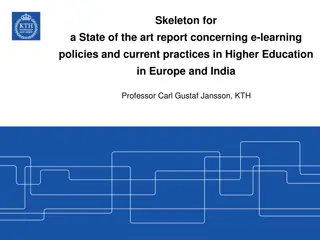Responsibilities and Organizations in Higher Education Law
Establishment, organization, and functioning of the National Qualifications Authority according to the Higher Education Law no. 199/2023. Responsibilities of Ministries and the National Qualifications Council outlined. Ministry of Education and Ministry of Labor and Social Solidarity have distinct roles in lifelong learning. Regulations and policies for vocational training and quality assurance are key aspects.
Download Presentation

Please find below an Image/Link to download the presentation.
The content on the website is provided AS IS for your information and personal use only. It may not be sold, licensed, or shared on other websites without obtaining consent from the author.If you encounter any issues during the download, it is possible that the publisher has removed the file from their server.
You are allowed to download the files provided on this website for personal or commercial use, subject to the condition that they are used lawfully. All files are the property of their respective owners.
The content on the website is provided AS IS for your information and personal use only. It may not be sold, licensed, or shared on other websites without obtaining consent from the author.
E N D
Presentation Transcript
n r e g i s t r a t c a o p e r a t o r d e d a t e c u c a r a c t e r p e r s o n a l c u n r . 2 5 7 2 0 National Qualifications Authority Establishment, organization and functioning according the Higher Education Law no. 199/2023 Tiberiu Gabriel DOBRESCU Nicolae POST VARU
n r e g i s t r a t c a o p e r a t o r d e d a t e c u c a r a c t e r p e r s o n a l c u n r . 2 5 7 2 0 SUMMARY 1. Responsibilities of the Ministries according to Law no. 199/2023; 1.1. Establishment, organization and functioning of the National Qualifications Authority (NQA); 2. Responsibilities of the NQA according to the draft Government Decision regarding the organization, structure, and functioning of the NQA; 3. Establishment, organization, functioning and duties of the National Qualifications Council (NQC); 4. Acts for which new regulations are issued, resulting from the provisions of the Education Laws no. 199 and 198/2023; 5. Questions and answers.
n r e g i s t r a t c a o p e r a t o r d e d a t e c u c a r a c t e r p e r s o n a l c u n r . 2 5 7 2 0 1. Responsibilities of the Ministries according to Law no. 199/2023 Article 186. (1) The Ministry of Education has the following main responsibilities in the field of lifelong learning: a) Elaborating national strategies and policies in the field of education and vocational training; b) Developing regulations regarding the organization and functioning of the lifelong learning system; c) Monitoring, evaluating and verifying, directly or through authorized bodies, the functioning of the lifelong learning system within its competence; d) Establishing mechanisms and methodologies for the validation and recognition of learning outcomes within its competence.
n r e g i s t r a t c a o p e r a t o r d e d a t e c u c a r a c t e r p e r s o n a l c u n r . 2 5 7 2 0 (2) The Ministry of Labor and Social Solidarity has the following main responsibilities in the field of lifelong learning: a) Collaborating with the Ministry of Education to develop national policies and strategies regarding the vocational training of adults; b) Regulating workplace professional training and professional training through apprenticeship at the workplace; c) Monitoring, evaluating, accrediting, and directly controlling or through authorized bodies, providers of training, other than those within the national education system; d) Coordinating and controlling the authorization of providers of adult vocational training, other than higher education institutions; e) Managing the national registers of providers of adult vocational training; f) Ensuring the regulation of the quality assurance system for providers of adult vocational training other than higher education institutions.
n r e g i s t r a t c a o p e r a t o r d e d a t e c u c a r a c t e r p e r s o n a l c u n r . 2 5 7 2 0 1.1. Establishment, organization and functioning of the National Qualifications Authority (NQA) The National Qualifications Authority: is established based on the provisions of Article 194 paragraph (1) of the Law on Higher Education no. 199/2023, as subsequently amended. its main responsabilities are established by the provisions of Article 196 paragraph (1) of the same normative act. The organization and functioning of the National Qualifications Authority are stipulated by Government Decision, in accordance with the provisions of Article 194 paragraph (5) of Law 199/2023.
n r e g i s t r a t c a o p e r a t o r d e d a t e c u c a r a c t e r p e r s o n a l c u n r . 2 5 7 2 0 The Board of Directors of the National Qualifications Authority (NQA) Article 195 of the Law on Higher Education no. 199/2023, with subsequent amendments, stipulates in paragraph (5): (5) The Board of Directors is appointed by the decision of the President of the NQA and consists of seven members: the President of the NQA and the Vice President of the NQA, two representatives of the Ministry of Education, as well as one representative designated by the Ministry of Labor and Social Solidarity, the Ministry of Research, Innovation and Digitalization, and the Ministry of Finance.
n r e g i s t r a t c a o p e r a t o r d e d a t e c u c a r a c t e r p e r s o n a l c u n r . 2 5 7 2 0 2. Responsibilities of the NQA according to the draft Government Decision regarding the organization, structure and functioning of the NQA I. According to Article 196, paragraphs (1) and (2) of Law no. 199/2023 on Higher Education, the National Qualifications Authority (NQA): Manages the National Qualifications Framework and its correlation with the European Qualifications Framework, as well as the National Qualifications Register; Participates in strategies and projects within its competence; Approves occupational/qualification standards; Organizes and manages the activity of sectoral committees and the relationship with the labor market; Establishes the National Accreditation Center, without legal personality; Regulates the field of qualifications. II. According to the draft Government Decision: National Europass Point; National Euroguidance Center; Competent authority for the Internal Market Information System (IMI) in its field; National contact point for ESCO; Recognition of training documents from training providers in the EU space; National Support Service for EPALE; Activities in the field of adult education; Regulatory institution for the occupations of "qualification systems specialist" and "professional competence evaluator"; manages the related registers.
n r e g i s t r a t c a o p e r a t o r d e d a t e c u c a r a c t e r p e r s o n a l c u n r . 2 5 7 2 0 3. Establishment, organization, functioning and duties of the National Qualifications Council (NQC) National Qualifications Council (NQC) Establishment Currently, the National Qualifications Council operates according to the provisions of Minister of National Education Order no. 4403/04.08.2022 approving the Regulation on the organization and functioning of the National Qualifications Council. Article 194 of Law no. 199/2023 on Higher Education, with subsequent amendments, stipulates in paragraph (11): (11) At the level of the National Qualifications Authority (ANC), an advisory council is established, consisting of representatives from pre-university and university education institutions, students, professional associations, central public administration, employers' associations, trade unions, and sectoral committees. The council assists ANC in establishing national strategies and action plans for the development of the National Qualification Framework (NQF) and lifelong education and vocational training. The organization and functioning regulations of the council are approved by order of the Minister of Education.
n r e g i s t r a t c a o p e r a t o r d e d a t e c u c a r a c t e r p e r s o n a l c u n r . 2 5 7 2 0 3. Establishment, organization, functioning and duties of the National Qualifications Council (NQC) According the Government Decision on the organization and functioning of the National Qualifications Authority Art. 8 (1) At the level of NQA, there is an advisory council without legal personality. (2) The council is composed of representatives from pre-university and university education institutions, students, professional associations, central public administration, employers' associations, trade unions, and sectoral committees. The appointment of council members is made by the decision of the president of ANC. (3) The regulation regarding the organization and functioning of the council mentioned in paragraph (1) is approved by order of the Minister of Education. (4) Members of the council do not receive compensation for participating in its meetings. (5) The funding for protocol activities, secretariat and the organization of council meetings comes from the NQA budget, as stipulated by law. (6) The president and vice president of NQA are ex-officio members of the council. (7) The term of office for council members is three years.
n r e g i s t r a t c a o p e r a t o r d e d a t e c u c a r a c t e r p e r s o n a l c u n r . 2 5 7 2 0 3. Establishment, organization, functioning and duties of the National Qualifications Council (NQC) Article 9: (1) The council mentioned in Article 8, paragraph (1), is led by the president of NQA. (2) The council is convened by the president or at the request of at least 1/3 of its members. (3) The council is convened by the president at least once per quarter. Article 10: The council mentioned in Article 8, paragraph (1), primarily performs the following duties: a) Supports NQA in developing national strategies and action plans in the field of qualifications and continuous professional training; b) Supports NQA in establishing and expanding relations with the economic and social environment, including all structures involved in the national qualifications system; c) Provides consultative input in the review of draft normative acts and methodologies related to the implementation of the National Qualifications Framework and continuous professional training.
Under review in 2023: Government Decision regarding the National Qualifications Register; Ministerial Order regarding ECTS credits.
n r e g i s t r a t c a o p e r a t o r d e d a t e c u c a r a c t e r p e r s o n a l c u n r . 2 5 7 2 0 4. Acts for which new regulations are issued, resulting from the provisions of the Education Laws no. 199 and 198/2023 5 Government Decision 16 Minister Order Non-tertiary education Law no. 198/2023 Government Decision on the approval of methodological norms for the development of the status and career path of personnel working in the field of lifelong education Government Decision on the approval of the National Strategy for the digitalization of education and the development of digital skills within the educational community Order of the Minister of Education approving the methodology for evaluating the results of continuous training programs and the framework procedure for financing Order of the Minister of Education approving the methodology for the authorization/accreditation of centers for assessing professional competencies acquired in non-formal and informal learning contexts 01.04.2024 01.09.2024 01.12.2023 01.04.2024
n r e g i s t r a t c a o p e r a t o r d e d a t e c u c a r a c t e r p e r s o n a l c u n r . 2 5 7 2 0 Higher Education Law no. 199/2023 Government Decision on the approval of the format and content of the national qualifications framework01.02.2024 Government Decision approving the methodology for the correspondence of qualification levels and job titles in the COR (Classification of Occupations in Romania) Government Decision on the approval of the National Qualifications Register 01.04.2024 2023
n r e g i s t r a t c a o p e r a t o r d e d a t e c u c a r a c t e r p e r s o n a l c u n r . 2 5 7 2 0 Higher Education Law no. 199/2023 Order of the Minister of Education approving the framework methodology for the organization and conduct of postgraduate programs for the professional training of adults. 01.02.2024 Order of the Minister of Education approving the methodology for the allocation of transferable credits in lifelong learning Order of the Minister of Education approving the methodology for the enrollment and registration of study programs in the National Qualifications Register Order of the Minister of Education approving the methodology for the development and updating of professional qualifications Order of the Minister of Education approving the methodology for the use of micro-certifications Order of the Minister of Education approving the methodology for the models of certificates used, the interoperability of registers, and the fluidity of data exchange Order of the Minister of Education approving the methodology for establishing criteria and procedures for the assessment and certification of professional competence evaluators, evaluator trainers, and external evaluators Order of the Minister of Education approving the methodology for the recognition of certificates obtained, as applicable, in formal, non-formal, and informal systems from authorized/accredited providers of professional training or from authorized/accredited competence assessment centers and/or within other entities with equivalent roles outside Romania 2023 2023 01.04.2024 01.04.2024 01.04.2024 01.04.2024 01.04.2024
n r e g i s t r a t c a o p e r a t o r d e d a t e c u c a r a c t e r p e r s o n a l c u n r . 2 5 7 2 0 Higher Education Law no. 199/2023 Joint Order of the Minister of Education and the Minister of Labor and Social Solidarity approving the correspondence between CNC levels, issued study or qualification documents, the type of education and professional training programs through which qualification levels can be obtained, reference levels of the European Qualifications Framework, as well as the corresponding access conditions for each qualification level Order of the Minister of Education approving the methodology for the identification, description, evaluation, validation, and certification of learning outcomes obtained in non-formal and informal contexts Order of the Minister of Education approving the methodology for the recognition of skills acquired by young people and adults in non-formal and informal contexts within assessment centers Order of the Minister of Education approving the regulation for the authorization/accreditation of centers for the assessment of professional competencies acquired in non-formal and informal learning contexts Order of the Minister of Education approving the standards for awarding the certificate of transversal competencies Joint Order of the Minister of Education and the Minister of Labor and Social Solidarity approving the methodology for the development, validation, approval, and management of occupational and qualification standards 01.04.2024 01.04.2024 01.04.2024 01.04.2024 01.04.2024 01.04.2024
n r e g i s t r a t c a o p e r a t o r d e d a t e c u c a r a c t e r p e r s o n a l c u n r . 2 5 7 2 0 5. Questions and answers
n r e g i s t r a t c a o p e r a t o r d e d a t e c u c a r a c t e r p e r s o n a l c u n r . 2 5 7 2 0 Thank you! CONTACT: Tel.: 021.313.00.50/021.313.00.51/+40.372.37.46.91 E-mail: office@anc.edu.ro Adres web: http://anc.edu.ro/




